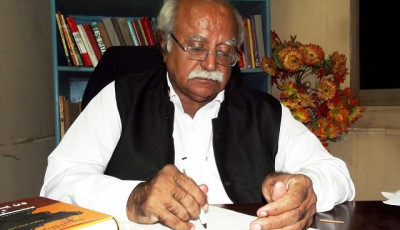By: Syed Qalandar Shah Lakhyari
[ Syed Qalandar Shah Lakhyari was an eminent educationist, scholar and recipient of presidential Pride of Performance. Prof Lakhyari served as chairman of the English literature department at the University of Sindh. After his retirement, he established the Qalandar Shah Institute of Education and Research in Hyderabad and organised a lecture series featuring renowned scholars of literature, history and languages. This article is sent to Daily News by his son Kazim Shah]
Until lately, Shah Abdul Karim of Bulri was called “The Morning Star of Sindhi Literature“, meaning, to be the one and only earliest poet whose poetry has reached us in written form and the shape of the verses in sufficient number. The verses were incorporated in his Malfoozaat compiled posthumously by a devotee of his. It contained eight verses of his predecessor Qazi Qazan too, whose work has recently been discovered and published.
Nonetheless, Shah Karim still holds the revered place of the sage, the saint, the Founding Father and trend-setter of Sindhi literature. It is said that the whole poetry of Shah Abdul Latif is nothing but a detailed commentary on the poetry of his illustrious great grandfather and spiritual ideal Shah Abdul Karim of Bulri.
Shah Abdul Karim was born at Matiari, a centre of spiritualism and Islamic teachings in lower Sindh, in the year 944 A.H. Although he belonged to the family of Sayyids, revered for their piety and scholarship, and also being the descendents of The Holy Prophet (SAWS), he could not get a formal education, beyond thenazerah recitation of two paras of The Holy Quran. Instead, he felt himself attracted towards the gatherings of Sufis and the sessions of sama’. His elder brother did not approve of this and was harsh on the younger brother. But on the intervention of their pious mother, who was aware of the spiritual inclinations of the child, he changed his attitude. Yet he got him married in a comparatively younger age. During his youth, Shah Abdul Karim had a spiritual encounter with a wandering derwesh, one Sultan Ibrahim, a soldier-turned-faqeer from Bihar, India. The former was initiated into Qadri system of Sufis by the latter. Later on Shah Abdul Karim joined the circle of Makhdoom Nooh, an eminent saint of SuharwardiSchool. He might have been formally admitted into the system as well. It is supposed that it was on advice of Makhdoom Nooh that Shah Abdul Karim shifted to Bulri, a small settlement in the south-west of Matiari. Here he started earning his livelihood for by tilling land. Although a man of no worldly means, he attracted around himself a number of scholars and seekers of truth. He held a highly reverend place among theulema and Sufis of the day. He would hold academic and spiritual discourses with them, and had travelled up to Gujrat, India, in this connection. This great figure of all times shifted to the eternal abode in the year 1032 A.H. leaving behind an enormous number of mourners.
Soon after his passing away, his disciples felt an urge to get his verses, sayings, and anecdotes compiled. Thus Muhammed Raza Thattawi, a scholar of high standing and a favourite disciple of Shah Abdul Karim, undertook upon himself to execute the task and, after an intensive and devoted investigation, and research of six years, completed the work and named it as Bayanul Arefin wa Tambihul Ghafelin. Multiple copies of the book seem to have transcribed and circulated among the lovers of spiritualism.
Shah Abdul Latif, his great grandson and a saint and poet of high standing, is said to have been carrying along with himself three books viz, The Holy Qur’an, the Mathnavi of Rumi, and Bayan ul Arefin. He would often ponder over them and seek wisdom and spiritual guidance from them.
A concise and versified translation of Bayan ul Arefin was made by one Abdur Rahman Kathbanbhan in 1213A.H. and the same was published by Abdus Samad Naurengzado from Mirpur Bathoro in 1293 A.H. It was mainly this version that the subsequent scholars made use of. It was Mirza Qaleech Beg who compiledRisala i Karimi in 1904 A.D., tracing the sources and evolution of the art and thought of Shah Abdul Latif. Following the suit, Dr.Daudpoto compiled the verses of Shah Abdul Karim along with a scholarly introduction. Memon Abdul Majeed sindhi got the verses of Shah Karim published in 1963 and then got Ph.D. degree on the theme and published his thesis in 1976.
All the above mentioned efforts were praiseworthy but meager enough to satisfy the needs of researchers and scholars as no full version of the book was accessible. When Dr. Soomro undertook upon himself the translation and reproduction of the original, he had to struggle to find one. Finally he could trace out only one copy of the book in possession of Sayyid Ali Mir Shah, a known scholar and a politician. It was transcribed by one Ziauddin in 1228 A.H. It is this version that the present translation is based on. The book was first published in 2003 by the Auqaf Department, Govt. of Sindh.
The compiler of Bayan ul Arefeen was both a scholar and a practsing sufi. He, therefore, had a deep insight into sufi lore and also an analytical mind which enabled him to present the host of anecdotes in a logical manner and simple, lucid style. The book is spread over an introduction, seven chapters, with some sub-chapters, and an epilogue.
Bsyan ul Arefeen is a valuable document on many accounts. It is a rich source of information about the history, geography, and culture of Sindh. Besides being mainly an authentic book on sufism and moral philosophy. The verses incorporated therein, are gems of artistic creation and could be proudly presented as a piece of the classic world heritage. A detailed critical analysis in required to tom reveal its artistic beauty in full, besides the indigenous poetic tradition.

